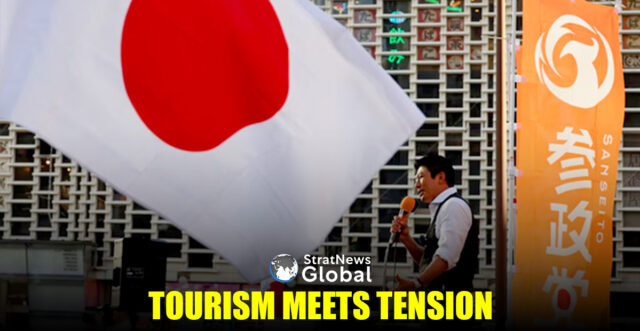Yuta Kato is growing increasingly frustrated with foreigners who disregard Japan’s social etiquette, from crowding Tokyo’s upscale Ginza streets to playing loud videos in public.
The 38-year-old hairdresser is among a growing number of Japanese voters drawn to the right-wing Sanseito party, whose warnings about foreigners helped it establish a strong foothold in an upper house election on Sunday.
‘Japanese First’
“It is not about discrimination, it’s just like, why don’t they notice?” said Kato, who, like many Sanseito supporters, obtains his information from YouTube and other social media sites, a space the party has utilised to amplify its “Japanese First” message.
Japan’s foreign-born residents account for just 3% of the total population, a fraction of the corresponding proportion in the United States and Europe, but record numbers of tourists in recent years have made foreigners more visible in major cities.
While Sanseito largely avoids identifying specific immigrant groups, Romeo Marcantuoni, a Tokyo-based academic who has studied the party, said it taps into latent concerns ranging from badly-behaved tourists to conspiracy theories about sneaking Chinese influence.
Kato said he believes the Chinese, the biggest cohort of foreign residents in Japan and among the largest visitor groups, are quietly taking over the country. Chinese are also often the focal point for anti-immigrant rhetoric propagated online.
Sanseito leader Sohei Kamiya and other party lawmakers and candidates have raised concerns about Chinese buying up land and resources in Japan. One of the party’s policies listed on its website is to “stop the silent invasion of Japan by foreign forces”.
The party did not immediately respond to a request for comment, and Kamiya has previously denied criticism that it is xenophobic.
Sanseito is most popular among 18 to 39-year-olds, with men favouring the party more than women, according to a poll conducted by public broadcaster NHK, a trend increasingly seen among support for right-wing parties in democracies worldwide.
In contrast, support for Ishiba’s ruling Liberal Democratic Party (LDP), which lost its majority in Sunday’s election, is deepest among those aged over 70 with no clear gender divide, the NHK poll showed.
Sanseito’s presence online has given them visibility among younger voters that the LDP has struggled to reach, Kato said.
The party’s official YouTube channel has three times as many followers as the LDP’s, with engagement in their content far higher than other parties, a study by Asahi newspaper found.
“They are the party of YouTube,” said Jeffrey Hall, a lecturer at Kanda University of International Studies who has authored a book on right-wing politics in Japan.
YouTube did not respond to emails seeking comment on Sanseito’s use of the platform. On its community guidelines page, YouTube says it closely monitors content and removes videos it deems to promote “harmful or dangerous behaviour”.
Broader Appeal
Birthed during the COVID-19 pandemic when they spread conspiracy theories about vaccinations, Sanseito has broadened its appeal with its tough immigration policies and pledges to help households struggling with rising prices.
It also wants to scrap Japan’s pacifist constitution and restore the Emperor’s authority, fringe ideas promoted by other right-wing groups that regularly drive around Japan’s cities in black trucks blaring imperial-era military songs.
While that megaphone politics has long been largely ignored by the Japanese, Sanseito has set its sights on emulating the successes of other far-right groups in Europe, such as Germany’s AfD and Britain’s Reform UK.
At a rally held outside Tokyo’s bustling Shimbashi train station on Monday, crowds clapped and cheered some of Sanseito’s newly elected lawmakers.
“They’re going to get things done,” said Eriko Harada, 47, a housewife wearing a kimono and a headband emblazoned with the words ‘Samurai Spirit’, who said she voted for the first time this year.
Sanseito’s rise has sparked a backlash by those who fear the party is normalising xenophobia. Monday’s rally attracted dozens of protesters who tried to drown out the speakers.
“It is people falling for lies and displacing their frustrations – economic hardship, political alienation – onto others,” said Miroko Kato, a 42-year-old haiku poet among the protestors. “We’re here to say: we’re watching you!”
(With inputs from Reuters)





